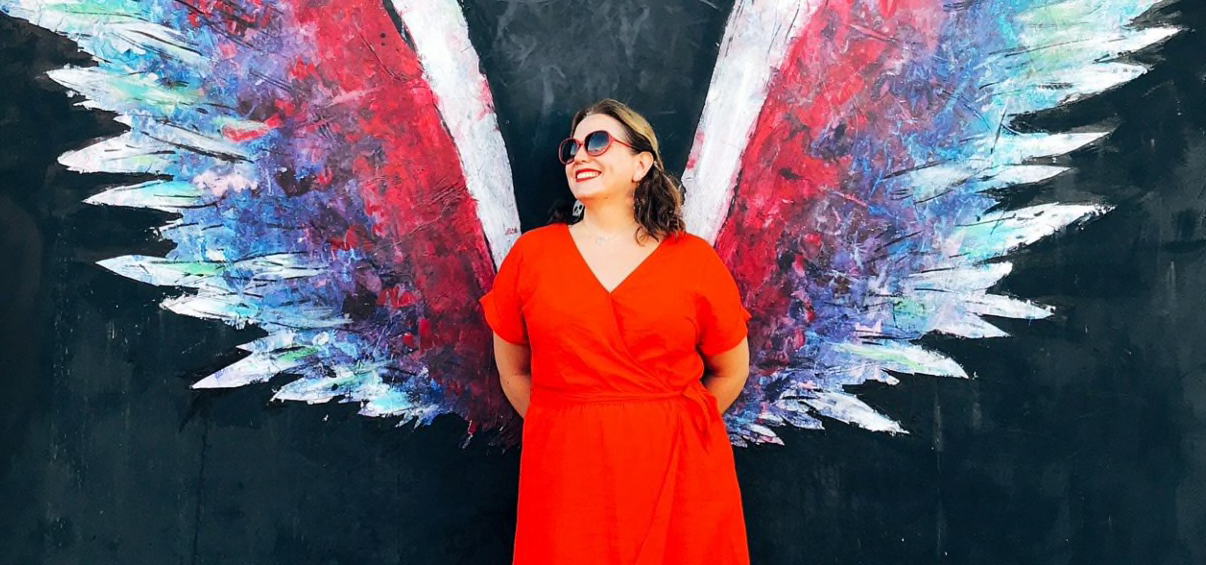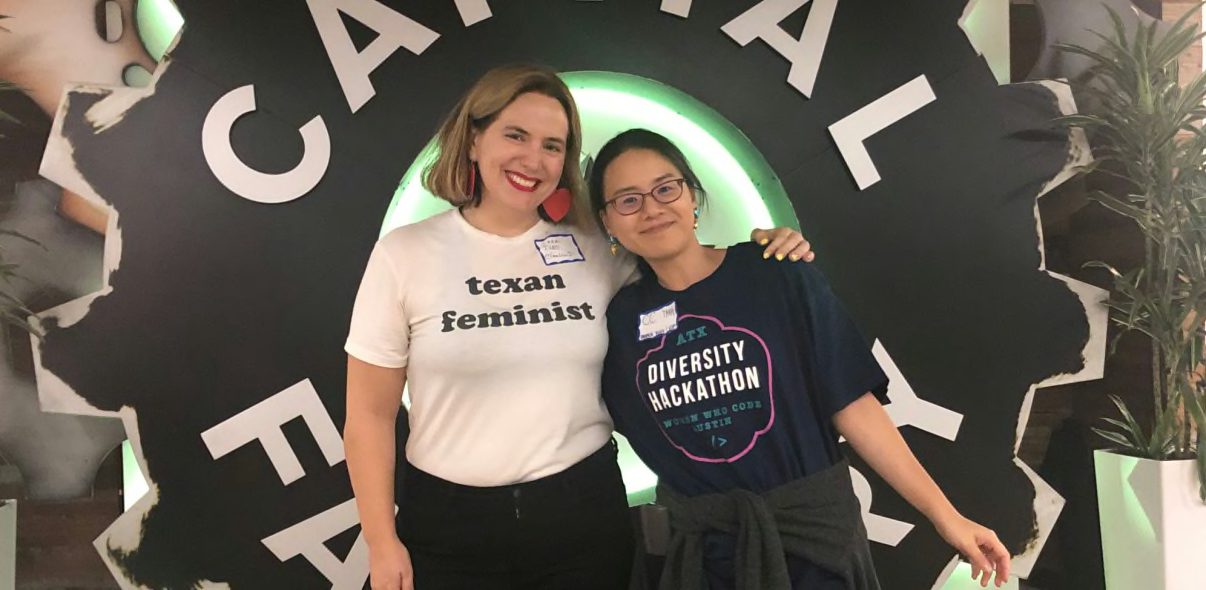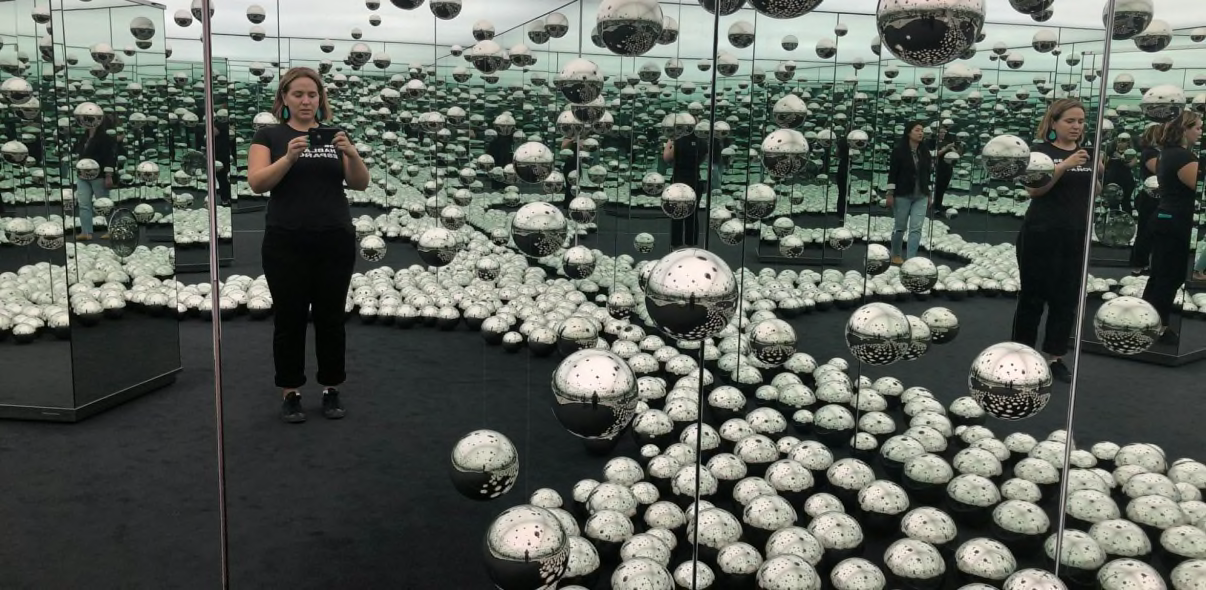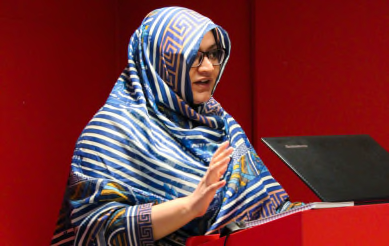Cracking the Code: Sara Inés Calderón
Shares Insights from her STEM Career

Sara Inés Calderón took a route to computer science that was full of twists and turns. But once she arrived, she really arrived. Today, having spent years as a consultant, software engineer, writer, speaker, and the Co-Director of Women Who Code Austin, Sara has hard-won experience to inform her opinions about her field. Recently, Sara took time to share her thoughts with the Logitech MX team for the #WomenWhoMaster series on learning styles, the importance of emotional intelligence in logic-heavy work, and how to carve out a place for yourself in STEM.
Q: Many people’s interest in STEM starts early. So tell us: were you a traditional computer geek growing up?
No, I was not. I came to technology as an adult. But my father is an academic, so I did have access to early email platforms and the command line even before America Online started sending out software CDs. I played around with those when I was in elementary school. And I certainly was into Nintendo and the '90s game consoles, which I would play with my brother. But I was more of a book nerd. I did a lot of reading and writing growing up, which, incidentally, I think have more relevance to engineering and tech than people realize. There's a perception that math and science are the only ways to hone logic and problem-solving skills, yet there’s a lot of logic and problem solving in reading and writing too.
But when I was in high school, I didn't know what computer science was. I ended up going to Stanford in the early 2000s, and that’s where I started to see a tech-centered culture and economy emerging. Although this was interesting to me, I pursued media in college and worked as a journalist, and that turned into creating technology. Over the course of my career in journalism, the relationship between tech and media got closer and closer until they were tightly intertwined. So my transition into STEM was not really a conscious decision so much as a natural evolution to keep up with the times.
Q: Was it difficult to learn that new skill set later than most other people in the field?
There were tough times, definitely. I ended up going to a coding school called Sabio, based in Los Angeles. There were only eight people in my class, but everyone was way better at coding than I was. I sometimes felt discouraged about my abilities there, but actually that period taught me an important lesson: we equate being smart with having a quick, intuitive grasp of a subject, but some of us just need a little bit more time to sit with things, or need a few more explanations to learn certain concepts.
We all filter and absorb information differently, we all have different strengths, and if you need more time, that doesn’t preclude you from becoming good at something or doing good work in that area.

Q: If you're not the fastest coder in the world, what are other qualities that could help you along in your STEM career, especially for women?
In my experience, women are very good at communicating, and that is an undervalued quality. Communication is the art of helping other people to understand what you mean, right? Without the emotional intelligence to ensure your concepts make sense to the other person, communication breaks down, and work won’t get done. So those so-called soft skills actually resolve inefficiencies. And I think that often gets lost in engineering organizations because they're usually run by men and there’s no one saying, “I really like the way that Sara is able to communicate the issues here because it allows for very quick resolution.” They’re saying, “Oh, man, Dave stayed up all night and worked all weekend and got all of this code done.” But I would definitely say
One thing women bring to the table is that they can facilitate good communication, which will almost automatically create efficiency.
The second point I would make, which dovetails with the first, is documentation. I create documentation everywhere I go. And again, what does documentation provide to an organization? It provides efficiency. With documentation, you can get people on the same page and create guides for how best to work on whatever technology you’re dealing with. And I think that getting into the habit of documentation could be very helpful to people breaking into STEM.
And finally, I would say there are biases that women have to grow around as they make their way through the maze of learning to work in technology. Women in this industry who are in it for any real length of time are probably going to be more hardworking or persistent than the average, and that will serve them well too, fair or not.
Q: These days, so many young people, including many young women, want to be creators or work on their own schedule. You’ve done contract and freelance work—do you have any advice for those who think that they might want to go that route? Should they pick a specialty? Should they network more?
I would say that there's more than one way to do it. For me, it's been easy to pick a specialty. I have this niche technology that I work in. It's called React Native, and it's essentially using JavaScript to build phone apps. I've been doing that for five years, which is a really good amount of time for that particular technology, and that puts me in the senior category. So it's worked out great for me. But with all technology, you have to be amenable to change, because change is constant. Before this, there was another JavaScript framework that was really popular called Angular. Before Angular, there was jQuery. So you’ve got to be on your toes.
But you don’t necessarily have to specialize. If you want to freelance, you could take a broad approach and say, “I'll just take whatever I can get in these three or four technologies.” That could go really well for you. But you're probably not going to get as high a rate as you would with a specialty. So there are pros and cons for each option. And if you're thinking, “Well, what should I specialize in?” you could go to all the job sites and play around with how many jobs are open for different technologies.
I would also say networking is great. Organizations like Girls Who Code and Women Who Code can be really excellent companions or drivers of your network. Women Who Code Austin, for example, has a Slack channel that has thousands of people on it. So every week someone's saying, “Hey, everybody, we have an opening, apply and I'll get you an internal referral.” If you're trying to find jobs or find opportunities, any kind of specialty organization can be really great for that.

Q: We've made incredible progress for women over the past 100 years, but where do you see the industry as a whole moving forward in the next decade or so?
That's an interesting question. I think remote work in particular is really going to change the industry and it might provide a more inclusive environment for women. If you’re a woman who has to commute to and from your child's school, for example, that could exclude you from having certain jobs, but with remote work some of those boundaries will be relaxed.
There also are different types of funding structures being refined now, like crowdsourcing and new forms of investments. These might ultimately create more opportunities for women and people of color, both to start their own businesses and to provide exciting projects to diverse engineering teams. In any case, I believe what we’ll see will look different from what we were used to seeing!
You can learn more about Sara by visiting her site here.
Connect with her on Twitter at @SaraChicaD or on LinkedIn.
She also volunteers for Women Who Code Austin in the United States, a community for professional women in technology careers.
Women Who Master puts a spotlight on women who have made outstanding contributions to STEM fields. The goal of the series is to celebrate those contributions, inspire future leaders, and help close the gender gap in technology.
Photo Credit: Sara Inés Calderón
#WOMENWHOMASTER
MEET THE MASTERS AT THE FOREFRONT OF STEM

Faiza Yousuf

Gabby Llanillo

Aisha Bowe

CODECADEMY AND LOGITECH
Partnering to inspire the builders of tomorrow, MX Series and Codecademy give you the tools needed to build, scale, and code to your fullest potential. Learn essential coding, programming, and AI skills to reimagine the future of tech with one free month of Codecademy Pro.

Women Who Master
Logitech MX is committed to spotlighting and supporting impactful initiatives and individuals that are disrupting the industry worldwide, to inspire girls and women to pursue a career or continue thriving in STEM.
With #WomenWhoMaster, our mission is to ignite an industry-wide movement that addresses the gender gap and unequal access to opportunities in tech and IT, once and for all.
